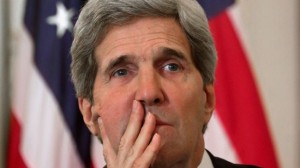U.S. calls on Saudi Arabia to stop funding jihadists
Monday, June 23rd, 2014 11:45:19 by Jamshed Sindhu
U.S. fears civil war in Iraq from becoming a wider conflict between Sunnis and Shiites in the Middle East. The complicity of Saudi Arabia and other Sunni Gulf countries with Iraqi insurgents and Shiite Iran close to Prime Minister Nuri al-Maliki is making Washington draw some worrying scenarios: the partition of Iraq in Mesopotamia until the emergence of a sanctuary for terrorists.
The Secretary of State, John Kerry, who yesterday began a tour of the region, will press Iraqi Shiite leaders to form a government that includes Sunnis and Kurds. He also asked the Sunnis allied countries to cut U.S. funding for the jihadists who in recent weeks have taken key cities like Mosul and have come to the capital, Baghdad.
Sunni jihadists of the Islamic State of Iraq and the Levant (ISIL) ” are a threat not only for Iraq but for the entire region,” said Kerry in Cairo, first leg of the trip that will also take Jorden, neighboring Iraq. Baghdad is not on the official itinerary. President Barack Obama has warned that the conflict could spread to “allies like Jordan ” and stop threatening Europe and the USA.
The White House attributes some of the responsibility for the current chaos to the exclusionary policies Sunnis of his former protege, Al Maliki. Considered an obstacle to reconciliation. But it has avoided calling for his resignation.
Kerry’s trip is a sign that the U.S. returns to Iraq after nearly three years of absence. U.S., then under President George W. Bush, invaded the country in 2003. In 2011 his successor, Obama, withdrew the troops.
Successive victories of ISIL have altered the options of the president. On Thursday, Obama announced to send 300 military advisers, members of the U.S. special forces prepared to help the Iraqi army to stop the advances of ISIL and if the president ordered air strikes to locate targets.
On paper this is not combat troops, an option that the White House excludes. But the fear in the U.S., a country with no appetite for new military adventures after the fiasco in Iraq and the quagmire in Afghanistan is that the ” advisors” are the prologue to greater involvement.
In a statement, the Iraqi government last week blamed Saudi Arabia “crimes that can be qualified as genocide” committed by the jihadists.
“Much of the funding and support during an extended period of time, has fueled extremism in Iraq has come from its neighbors,” a senior State Department official told reporters on the plane carrying Kerry to Cairo on the condition of anonymity. “This,” he added, “does not mean that is the result of government policy in most cases, but that these governments can do more to stop some of this help.” The American administration is concerned about the funds the jihadists receive from countries like Saudi Arabia and Qatar.
U.S. relations with its Persian Gulf allies have deteriorated, among other reasons, wavering Obama in the civil war in Syria and its willingness to negotiate with Iran over its nuclear program. These countries ” have lost all faith in this administration,” Kenneth Pollack, a member of the National Security Council in the Clinton Administration, said a few days ago at a conference in the think tank Brookings Institution.
Pollack sees a partition of Iraq into three states -Kurdish, Sunni and Shiite, as “most likely outcome” of the civil war. “It will be very difficult for the Iraqi government take back territory that the Sunni coalition has taken. And it will be very difficult for the Sunni coalition move beyond the territory they have already taken,” he said. A Shiite state in the south, aligned with Iran, the Persian influence lead to the border with Saudi Arabia, his bitter enemy. Sunnis prefer U.S. kept Iraq together, but if they do not, the alternative is “the most aggressive launch of a war to lessen the control of Iran in southern Iraq,” said the expert.
In the struggle between Sunnis and Shiites, the U.S. is sometimes found on opposite sides. In Iraq government faces ISIL and placed in the same trench with Iran. In Syria the Bashar Assad regime fighting ISIL, U.S. enemy and ally of Iran.
Obama determines the success of a military intervention in Iraq a political agreement between the communities. But White House sources have made clear that, whatever happens with Al Maliki, if U.S. interests are threatened, the U.S. will intervene.
“We do not restrict a potential U.S. action to a specific geographical space actio,” a senior Obama Administration official warned last week who requested anonymity. USA reserves the right to bomb the ISIL in Iraq or Syria. The boundaries are blurred between the wars.
Short URL: https://www.newspakistan.pk/?p=45603

















